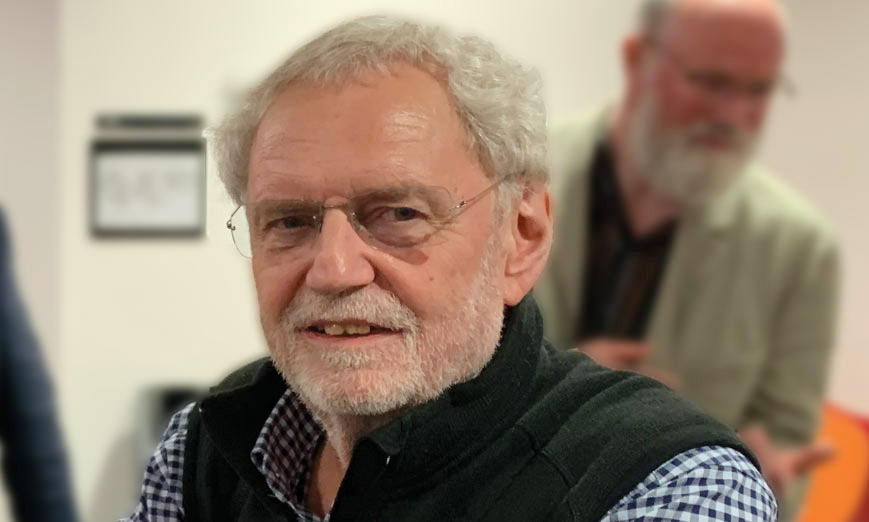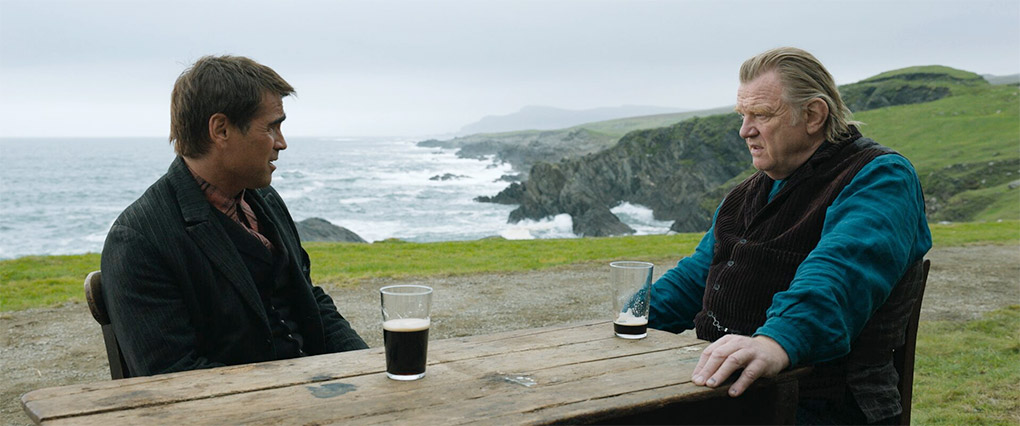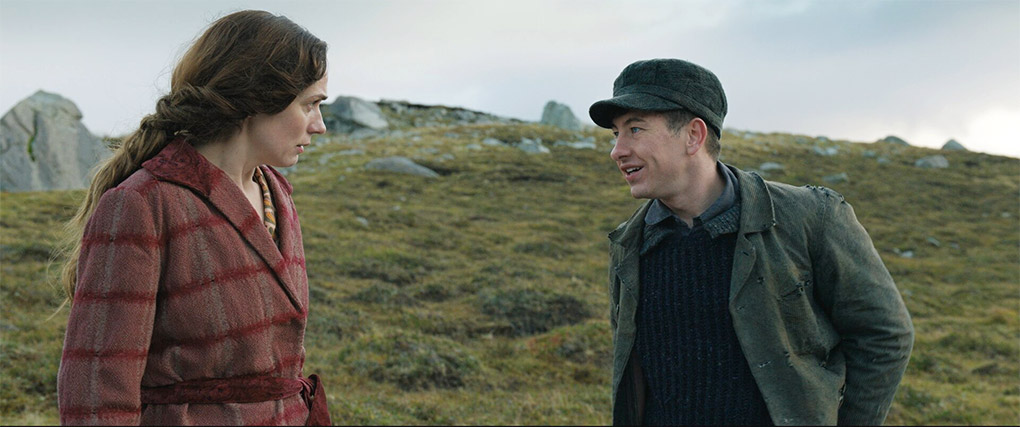| |
"Banshees burrows into the stereotype of Irish people at pubs, guzzling pints to the tune of ebullient folk music, and moulds it into an emotionally resonant character study. "The starting point was to capture the sadness of a breakup, be it a love breakup or a friendship one," McDonagh said. "Being on both sides of that is an equally horrible position. To treat the sadness of both sides as truthfully as possible was the main thing I wanted to get right with this."" |
| |
Writer/Director Martin McDonagh* |
Cinema for grown-ups is alive and well under Martin McDonagh's watch. Three Billboards is enough of a diamond on a CV but add In Bruges and The Banshees of Inisherin and you're off to the races. Here is a writer with impeccable craft, humour in all shades, humanity by the skip-load and as a director he knows how to shepherd superb performances and just the right place to shoot them from. Apart from its breathtaking and stark location conveniently sun-drenched for the whole shooting period, McDonagh is well served by editor Mikkel E. G. Nielsen who lets the moments not only breath but deeply resonate. I suspect his outstanding work on Sound of Metal got him this gig. A greater percentage of the pleasure of Banshees is derived from Farrell's and Gleeson's faces and both director and editor know how to front line them. There was an added emotionally personal twinge for myself at the close of the film with the first credit reading 'In Memory of Jon Gregory.'

Jon was a lovely man, a brilliant film editor whose masterclass I attended and a fellow member of the British Film Editors. Jon died in September 2021, a great loss to his family, director McDonagh and the industry.
So here we are on the fictitious island of Inisherin, a mosaic of farmland, divided by stone walls which are pleasingly and defiantly crooked. A small community of farmers live here, each eking out a living as best they can. It's 1923 and the last spoils of the Irish civil war are being fought over on the mainland. Gunfire and a few explosions remind us that turmoil is a mere boat ride away. There's a very different, internal turmoil brewing on the island. Pádraic Súilleabháin (Farrell) lives a simple life - not that a complex one is easily attainable given the restrictions of the location and opportunities for advancement beyond reading books. He takes his cows from one grazing spot to another, is used to spending a few hours in the local with his close friend, folk violinist Colm Doherty (Gleeson) and shares his house with his sister, living as if still children, sleeping in the same bedroom. He is also especially attached to his animals particularly Jennifer the donkey which he lets wander in to the house when his sister isn't looking. Pádraic is not blessed with ambition or too much worldly sense but, in the words of so many characters in the film, he's nice. This is why it comes as such a momentous shock to him to be ignored by his best friend while trying to meet him for a drink, something the film implies is second nature to the pair of them. Colm, older and more introspective, despairs of his drinking companion's 'dullness', pulls no punches in severing all ties with his once friend (that's by no means the end of the severing) and threatens self-harm if Pádraic so much as speaks to him ever again. This is where reason turns a blind eye to the far-fetched threat which is anything but. But reason is not what's on offer here. This is a film about human beings (remember them?) with just their own wits to live by, their passions subsumed by their lifestyle and with their own grievances to air however absurd. That's quite the set-up. It's better if you go in cold from here on in.

All I knew about the film was in the trailer and as I'd had such fun with the two men in Bruges, I sort of hoped for a similar vibe. Ah, not quite. The comic brilliance Farrell displayed in Belgium here is muted and much darker. He's a simpler soul than Bruge's assassin Ray. He wears his heart on his grief at being so brutally rejected. Colm is undergoing a predicament of a different sort, and I have to use the dreaded phrase 'existential crisis'. He's all too aware of his own mortality and believes that by eschewing his friend's inanity as a literal waste of his time, he can create music that will survive him. That inflated self-belief in his own talent (justified or not is not up for debate) keeps the inching, dripping venom of despair at bay.
Banshees has many themes swirling within its deceptively simple structure but the dominant one, that of love lost is the idea that steers the ship. That it's between two men, two (one assumes perhaps incorrectly) heterosexual men, makes this film all that more refreshing. Masculinity is a subject much decried recently under attack for its apparent rampant toxicity. This film deals with male characters in ways much more profound than headline-grabbing 'twitticisms'. Masculinity is represented in many forms in the film and some more tragic than others. But it's Farrell's show as a man forced into an existential crisis (not that he'd know what that was by his own admission) by a man trying to shake off his own. Pádraic's sister Siobhán, played winningly by Kerry Condon is as poignant and tender as her brother and in some ways a more practical and emotionally stronger character whose good sense doesn't stop her from being somewhat lost on such a limited island with so few opportunities for personal growth despite ironically growth being the livelihood of the farmer. The local tearaway, seemingly a few slices short of an Irish Tea Cake, is Dominic, played by Barry Keoghan. His situation will not allow him to escape his childhood undamaged. Inisherin's society is the perfect example of a community unable to shift its character dynamics to allow someone clearly in need of help to get it.

I will avoid any further plot points or spoilers from now on because the joy is in the journey. However, there are aspects to the production that are worth noting. Firstly, it's not only the human actors who are award-worthy. The afore mentioned donkey, Jennifer, steals a few scenes but not as many as the horse whose empathy with Pádraic's predicament borders on the supernatural, that or just sharply judicial editing. Colm's dog is also very well trained but what do you expect from a border collie, a particular favourite of mine. And then there's the intensely peculiar sound design. Sound, as many in film post-production know is probably more important than the picture in the evocation of emotion. Inisherin is an island surrounded by the sea that we hardly ever hear. A small confession; I started treatment for an ear infection the day I saw this film but I stand by my surprise and delight at the film's almost total lack of ambient sound. Dialogue cuts through virtual silence as interior and exterior atmospheres don't even bubble in a sound bed beneath voices. They practically cower. Yes, big foregrounded sounds have fair representation except for the ocean but it seems as if everything else is utterly subservient to the dialogue. Is that the playwright in McDonagh asserting a theatrical trope? It's absolutely fascinating regardless the creative reasons for it. The more aware I was of the lack of atmospheric sounds, the quieter the film became. In the music department, Carter Burwell's score is a magical delight with cues from classical sources interspersed. Using traditional instruments like the harp and the celesta, he eschewed what director McDonagh called 'diddly-di Olde Worlde Oirish film music', and embraced an almost fantasy ambience which would not be too out of place at Hogwarts. For all of its conjuring of spells and mythology, it's a perfect fit. Showing some respect, Burwell let violinist/actor Brendan Gleeson actually compose the musical piece that gives the film its name after turning down a two-man competition suggested by Gleeson himself.
As a very good friend of mine mentioned this morning, "I really love 'normal films' about people," as we are all a little bit super-heroed out these days. I cannot disagree. Despite its subtlety and its deceptively ordinary central conflict, Banshees of Inisherin has more layers than a lasagne wedding cake and is just as oddly flavoursome. Not that it has any great meaning to add to such an accomplished film but if the director, actors and the film itself are not showered with award nominations in the coming season, then I'd say the industry may have lost its way. If it's new myths we need for the eternally mysterious human condition, I think we've found our filmmaker. One of the best of the year if not the best so far.
|